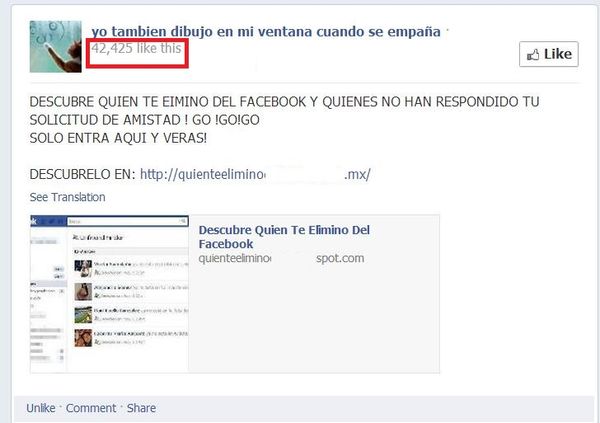Spanish Targeted on Facebook by 'Who Deleted You' and 'Free Credits' Scams

Spanish curiosity is once again exploited by cyber-criminals, who are making money from two main scams. “Quien te elimino de Facebook” (“Who deleted you on Facebook”) and “Creditos de Facebook gratis” (“Free Facebook Credits”) are making rounds on the social network, spreading through fraudulent websites on Google`s blog service, Blogger.
 More than 42,000 Spanish users have already liked the scam that promises to show them who can`t stand them on Facebook anymore. The old “blocking” theme was reiterated on blogspot.com, the domain most used for hosting social media scams.
More than 42,000 Spanish users have already liked the scam that promises to show them who can`t stand them on Facebook anymore. The old “blocking” theme was reiterated on blogspot.com, the domain most used for hosting social media scams.
 “Discover who deleted you from Facebook and who hasn`t answered your friend request. Go! Go! Go! Just click the link to see!,” the fraudulent post reads. One curious click brings unwary users to deceptive surveys that can steal their credentials.
“Discover who deleted you from Facebook and who hasn`t answered your friend request. Go! Go! Go! Just click the link to see!,” the fraudulent post reads. One curious click brings unwary users to deceptive surveys that can steal their credentials.
Other old scams that still prey on the Spanish community promise free credits for legitimate gaming applications. “If you play Farmville, Cityville and all the other Facebook games, and want free credits, click here [website removed],” one spam message reads.
The message then redirects users to dangerous surveys that ask them to vote for Mexico City, claiming thousands of fans already did. In the end, rating their favorite city can only be done after they send their Facebook login and password.
Tips and tricks for Spanish users:
- Facebook users should be extra-careful with rogue apps that promise features the social network doesn`t provide because of their privacy implications.
- Be skeptical even if the messages are written in good Spanish. Cyber-criminals are learning to be more careful when crafting scams to avoid raising suspicions.
- Words such as “official” or “finally” seek to trick users into thinking Facebook has updated its features to allow them to see who deleted them or who has been viewing their profile.
- Liking and sharing scams such as “who viewed your profile,” “who deleted you” or “free credits” may actually lead your real friends to delete you from their list, or even report you for spam.
- Always check the permissions your applications request. Many scams access your information, your list of friends, and may post on your timeline and on theirs, without your knowledge.
- If you did install a scammy application, remove it from Account > Privacy Settings > Applications and Websites. Don`t forget to warn your Facebook friends and to delete the scam from your timeline.
- Avoid participating in dubious online surveys. Some are run by affiliate marketers who give scammers a commission for every user that completes them, while others are a malware dissemination tool.
- Don`t forget to install an antivirus solution for protection from e-threats ranging from malware and phishing, to spam and fraud spread on social networks.
- Spanish users may also take advantage of the free Bitdefender app Safego that will protect them and their friends from the latest online threats, scams, spam, malware and private data exposure.
Note: All product and company names mentioned herein are for identification purposes only and are the property of, and may be trademarks of, their respective owners.
tags
Author
Bianca Stanescu, the fiercest warrior princess in the Bitdefender news palace, is a down-to-earth journalist, who's always on to a cybertrendy story.
View all postsRight now Top posts
Start Cyber Resilience and Don’t Be an April Fool This Spring and Beyond
April 01, 2024
Spam trends of the week: Cybercrooks phish for QuickBooks, American Express and banking accounts
November 28, 2023
FOLLOW US ON SOCIAL MEDIA
You might also like
Bookmarks








